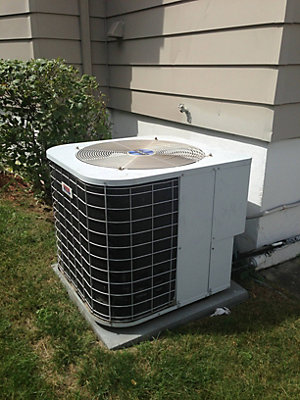Do Heat Pumps Work in Cold Climates?

In the winter, heat pumps basically “soak up” heat from the outdoor air and move it indoors to keep you warm.
So, given that Colorado’s winter lows can drop to 20 degrees, homeowners often ask us: “Can a heat pump really heat my home, even when there’s barely enough heat outdoors to pull inside?”
Good question.
The short answer? Yes, heat pumps can still heat a home really well, even if you live in the coldest regions of the country.
The long answer? Well, heat pumps definitely lose capacity as the outdoor temperatures get colder. But heat pumps have a “backup” plan for when that happens.
Let’s take a closer look at how heat pumps work when the outdoor temperatures are too cold.
What happens when a heat pump can’t keep up?
When the outside temperatures get so low that the heat pump can’t soak up enough heat to warm your home, it just switches to “backup” heating (also called “supplemental” or “second-stage” heat).
And the heat pump system does this automatically, so you’ll stay comfortably warm no matter the weather outside.
So, what exactly is this “supplemental heat”?
Well, if your home is an all-electric home, your supplemental heat comes from electric resistance coils (like the ones in your toaster). If your home has natural gas, your supplemental heat probably comes from a gas furnace that jumps in to help out when your heat pump is struggling. The gas furnace is far more efficient than the electric resistance coils.
But whether your home uses electric resistance heating or gas, your supplemental heating is less efficient and therefore more expensive to run than heat pump heating.
This leads us to a more important question:
Will a heat pump fit my home and heating needs?
So now that we’re sure a heat pump works well in cold weather, you’re probably wondering whether it’d be a cost-effective and more efficient switch for your home.
Well, that depends.
If you live in an area that commonly gets cold snaps (any weather below 35 degrees), you’re going to be using your supplemental heat a good bit. And remember that supplemental heating is more expensive and less efficient than heat pump heating.
Our suggestion?
For cold climates, buy a heat pump combined with a gas furnace. This powerful duo, also called a “dual fuel” system, prevents you from having to use expensive, energy-hungry electric resistance heating. Already have a furnace? Even better. A heat pump system can work with existing heating systems.
If you don’t have natural gas available in your home, try asking a professional whether it would be worth it to invest in a heat pump.
Ask a Colorado tech if a heat pump is right for your home
Still wondering if a heat pump could work for you? We’re here to help.
Plumbline Services’ heating specialists can discuss your heating needs and go over heat pump estimates with you.
Related reading:
Need help from a Colorado Plumbing, Heating, Cooling, or Electrical Specialist?
For your convenience, you can request an appointment in one of two ways:
- Call us at (303) 436-2525 for immediate assistance.
- Click on the button below to schedule your appointment online.
Related Reading
Join Our Email Newsletter
Receive updates, current news, promotions, and industry tips.
